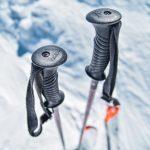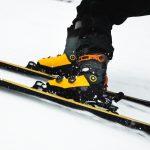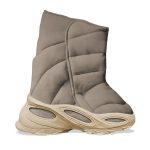Ski pole size advice with easy to use size charts
What are ski poles and why is a good ski pole size important?
Ski poles, also called sticks or stocks, are used by skiers to offer stability, balance, and propulsion while skiing in snowy areas. Ski Poles are mainly used in Alpine Skiing, Freestyle Skiing, and Cross-Country Skiing, but are not used by ski jumpers. A standard size ski poles size range is a length of 44”-52” (110-130 cm) and pole diameter of .75” (19.1 mm) averagely, Ski Pole weight (or mass) is between 10.23-13.05 oz (290-370 g). In the Ski Pole size chart, we’ll explore the parts of the ski pole, (like the basket and grip elements). The basket is designed to stop the pole from sinking too deep into the snow and the grip slips over the wrist of the skier. The length and material of Ski Poles depend on the preferences of the skier.
Pieces of equipment used by skiers are boots, Socks, Gloves, poles, Helmets, skis, and binding. Mostly underestimated, but the most important tool is the ski pole since it boosts one’s performance and offers rhythm, balance, and perfect timing during turns.
There are three types of ski poles derived from the materials they made them from they include;
- Aluminum poles – are one of the cheapest ski poles and have longer durability.
- Composite poles – are best suited for hard snow because of their ability to absorb shock.
- Carbon poles – are quite expensive because they are flexible lightweight and tapered.
Sizing is an important factor for skiers while skiing because if the pole is too short pole planting on the ground will be difficult affecting your turning and if it’s too long skiing interference is experienced
Therefore, one has to find a suitable size to match their body height. If you find the correct size, your elbow should form a 90-degree angle.

Ski Pole dimensions summarized
As a quick overview, you can start with these ski pole sizes
- Ski Pole Width: .75” – 19.1 mm
- Ski Pole Length: 44”-52” – 110-130 cm
- Ski Pole Weight: 10.23 – 13.05 oz – 290-370 g
- Basket Diameter: 2”-4” – 50.8-101.6 mm
- Materials: Carbon fiber, graphite, Aluminum
Skier Heights compared to Ski Pole length
- Children 4′ – 5’1″ skiers height: 26- 42″ – 66 – 105 cm
- Children/women 5’1”-5’3” skiers height: 44” – 110 cm
- Youth/women 5’4”-5’6” skiers height: 46” – 115 cm
- Youth/Women/Men 5’7”-5’9” Skiers height: 48” – 120 cm
- Youth/Men 5’10”-6’ skiers height: 50” – 125 cm
- Youth/Men 6’1”-6’6” skiers height: 52” – 130 cm
Discover the Ski Pole Size Chart
The table below illustrates a downhill ski pole size chart. The size chart starts from children’s height until adult height in cm and inches
| Skier Height in inches | Skier Height in centimeters | Pole Length in inches | Pole Length in centimeters |
| 4’ | 122 centimeters | 26 – 34 inches | 66 – 88 centimeters |
| 4’4’’ | 132 centimeters | 28 – 36 inches | 71 – 91 centimeters |
| 4’8’’ | 142 centimeters | 30 – 38 inches | 76 – 96 centimeters |
| 5’ | 152 centimeters | 32 – 40 inches | 91 – 101 centimeters |
| 5’4’’ | 163 centimeters | 34 – 40 inches | 96 – 106 centimeters |
| 5’6’’ | 168 centimeters | 36 – 44 inches | 101 – 111 centimeters |
| 5’8’’ | 173 centimeters | 38 – 44 inches | 106 – 116 centimeters |
| 5’10’’ | 178 centimeters | 40 – 48 inches | 110 – 120 centimeters |
| 6’ | 183 centimeters | 42 – 50 inches | 117 – 127 centimeters |
The table below shows a pole length chart of a Salomon ski pole size chart.
| Your height | Pole length in inches | Pole length in centimeters |
| 3’4’’ | 32 inches | 80 centimeters |
| 3’8’’ | 34 inches | 85 centimeters |
| 4’0’’ | 36 inches | 90 centimeters |
| 4’4’’ | 38 inches | 95 centimeters |
| 4’8’’ | 40 inches | 100 centimeters |
| 5’0’’ | 42 inches | 105 centimeters |
| 5’3’’ | 44 inches | 110 centimeters |
| 5’6’’ | 46 inches | 115 centimeters |
| 5’9’’ | 48 inches | 120 centimeters |
| 6’0’’ | 50 inches | 125 centimeters |
| 6’3’’ | 52 inches | 130 centimeters |
| 6’6’’ | 54 inches | 135 centimeters |
| 6’7’’ | 56 inches | 140 centimeters |
The table below represents different size ski poles in comparison with skier height and style in a cross-country size chart.
| Skiers height | Classic style | Skate style | Touring style | |
| 2’ 9’’ | 84 centimeters | 70 centimeters | 80 centimeters | 70 centimeters |
| 3’ | 91 centimeters | 75 centimeters | 85 centimeters | 75 centimeters |
| 3’ 3’’ | 99 centimeters | 80 centimeters | 90 centimeters | 80 centimeters |
| 3’ 6’’ | 107 centimeters | 85 centimeters | 95 centimeters | 85 centimeters |
| 3’ 9’’ | 114 centimeters | 90 centimeters | 100 centimeters | 90 centimeters |
| 4’ | 122 centimeters | 95 centimeters | 105 centimeters | 95 centimeters |
| 4’3’’ | 130 centimeters | 100 centimeters | 110 centimeters | 100 centimeters |
| 4 6’’ | 137 centimeters | 105 centimeters | 115 centimeters | 105 centimeters |
| 4’7’’ | 140 centimeters | 110 centimeters | 120 centimeters | 110 centimeters |
| 4’8’’ | 142 centimeters | 115 centimeters | 120 centimeters | 110 centimeters |
| 4’9’’ | 145 centimeters | 115 centimeters | 125 centimeters | 115 centimeters |
| 4’10’’ | 147 centimeters | 120 centimeters | 125 centimeters | 115 centimeters |
| 4’11’’ | 150 centimeters | 120 centimeters | 130 centimeters | 120 centimeters |
| 5’ | 152 centimeters | 125 centimeters | 130 centimeters | 120 centimeters |
| 5’1’’ | 155 centimeters | 125 centimeters | 135 centimeters | 125 centimeters |
| 5’2’’ | 157 centimeters | 130 centimeters | 135 centimeters | 125 centimeters |
| 5’3’’ | 160 centimeters | 130 centimeters | 140 centimeters | 130 centimeters |
| 5’4’’ | 162 centimeters | 135 centimeters | 140 centimeters | 130 centimeters |
| 5’5’’ | 165 centimeters | 135 centimeters | 145 centimeters | 135 centimeters |
| 5’6’’ | 167 centimeters | 140 centimeters | 145 centimeters | 135 centimeters |
| 5’7’’ | 170 centimeters | 140 centimeters | 150 centimeters | 140 centimeters |
| 5’8’’ | 172 centimeters | 145 centimeters | 150 centimeters | 140 centimeters |
| 5’9’’ | 175 centimeters | 145 centimeters | 155 centimeters | 145 centimeters |
| 5’10’’ | 178 centimeters | 150 centimeters | 155 centimeters | 145 centimeters |
| 5’11’’ | 180 centimeters | 150 centimeters | 160 centimeters | 150 centimeters |
| 6’ | 182 centimeters | 155 centimeters | 160 centimeters | 150 centimeters |
| 6’1’’ | 185 centimeters | 155 centimeters | 165 centimeters | 155 centimeters |
| 6’2’’ | 187 centimeters | 160 centimeters | 165 centimeters | 155 centimeters |
| 6’3’’ | 190 centimeters | 160 centimeters | 170 centimeters | 160 centimeters |
| 6’4’’ | 192 centimeters | 165 centimeters | 170 centimeters | 160 centimeters |
| 6’5’’ | 195 centimeters | 165 centimeters | 175 centimeters | 165 centimeters |
| 6’6’’ | 198 centimeters | 175 centimeters | 175 centimeters | 165 centimeters |
How to choose the right ski poles size?
Although size is an important factor to consider when choosing a pole other additional features are imperative in the selection process for example;
Materials– the shaft of a ski pole affects its longevity, price, and weight, carbon ski poles are desirable because of their lightweight but are quite expensive and they damage easily if hit on a hard surface fortunately there are several aluminum ski poles that are affordable, strong and great for trekking
Basket – a ski pole basket ensures the pole doesn’t submerge in the snow as you pole plant.
Straps – ski pole straps range from a detachable strap to an adjustable nylon strap. When falling they assist a skier to prevent an injury.
Grips – Some poles have ergonomic grips for users that offer comfortability.
How do you measure ski pole height?
An alpine ski pole size follows certain criteria to get the correct size for the user;
Your arm should be straight on the side of your body and the elbow has to bend for your arm to stick out at a 90-degree angle. Wear a ski boot or shoes with platforms for you to be above the ground and avoid having shorter poles.
Use a tape measure with your other hand and let it drop to the ground write the dimension ensuring it’s an even number even it’s an odd number round it off to an even number.
The addition of two inches is necessary because measuring a pole stick is from where it begins to its end. Once you have your personal perfect ski pole size, you can visit a shop and purchase your desired choice with its dimension nearest to yours.
How do you choose ski pole size?
First, the height of the pole should correspond with the type of skiing you like and also suit your personal preference. Use a measuring tape to get the approximate length of the pole by placing it on the handle to the tip of the stick.

Once you get the correct measurement a ski pole height chart guide will help you choose the one that matches your height. In addition, some have adjustable poles therefore, one can change the height to fit their activity. The different types of Ski Poles and their sizing include Racing Poles, Super Giant Slalom Poles, and Nordic Walking Poles.
Ski Pole Sizing explained
Conclusion
Whether it’s for a beginner who is training on the basics of skiing or an advanced skier who uses it for mobility or to fine-tune their turning and balance on challenging terrain, ski poles are an important tool for them to master their craft in the snow.
Choosing the perfect ski pole size will depend on the ski style they prefer and also the type of terrain. Ski poles are made of different materials therefore your budget will determine which type of pole you will buy.
Since there exists a number of skiers whether experienced skiers or average skiers assistive features like straps baskets and grips are an imperative mechanism for them since they offer safety.
In conclusion, sizing helps in choosing the correct ski pole length, and also one can measure by themselves in the comfort of their homes or visit a ski shop that offers a size guide.
If you enjoyed reading, please leave a comment.
Related Ski and snow size charts
- Ski pole size advice with easy to use size charts
- Bogner Size Chart: Fire+Ice Sizes for men, women & kids
- Ski helmet size chart
- Ski Boots Size Chart – Measurements And Fitting
- Snowboard Size Chart – Guide To Choosing A Snowboard
- Skiing Gloves Size Guide – Determine Your Glove Size
- Yeezy NSTLD Boot Size Chart and Fitting








